CYCLONE
The cyclone season officially runs from 1st November to 30th April each year. It is very important to remember, however, that cyclones have been known to occur every month of the year.
Emergency Information: 13 3337 SES Emergency Assistance: 132 500
Cyclone!
The Department of Fire & Emergency Services is the designated Hazard Management Agency for Cyclones in Western Australia and has much information available regarding preparation for cyclones, actions to take during cyclone alerts, and general information associated with any of the possible outcomes of cyclone impact. Our communities sometimes become complacent about cyclones, this places both the individual and the community at risk - cyclones can damage and devastate our communities as we experienced in 2015 with Cyclone Olwyn.
What is a Cyclone
A cyclone is an area of extremely low pressure characterised by rotating winds around a central calm "eye". The most destructive winds are closest to the eye, with damaging winds sometimes extending over one hundred kilometres from the centre of the cyclone. A cyclone often produces large amounts of rain. In addition to damage from wind gusts, flooding may occur within the affected area, associated catchment area and river basins.
In severe cyclones, wind gusts in excess of 280 km/hr can and do occur.
|
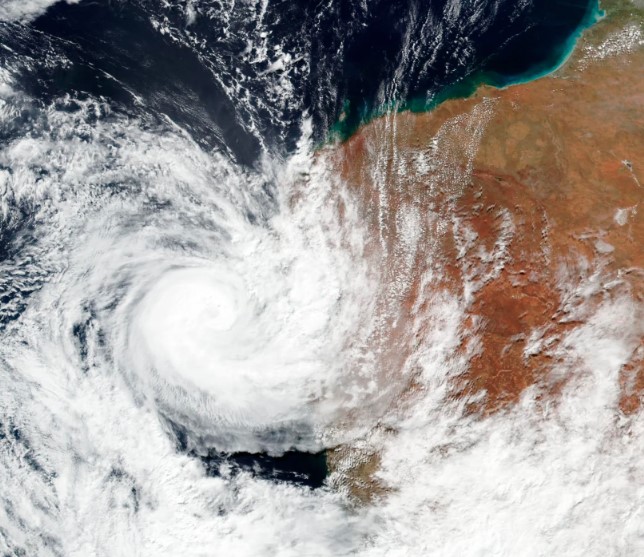
BOM Satellite Image of a cyclone
|
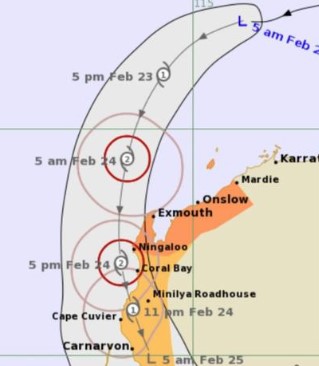
BOM Cyclone Tracking Data
|
The New Australian Warning System
2024 saw the launch of the Australian Warning System (AWS). Please read this information as it may save property and lives.
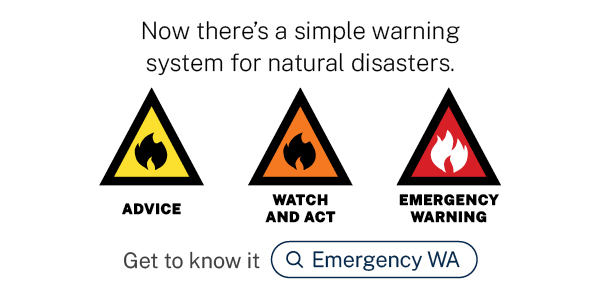
About the New AWS
Learn about the new Australian Warning System (AWS) at these sites.
Australian Warning System DFES
Australian Warning System - National
Call to Action - Advice
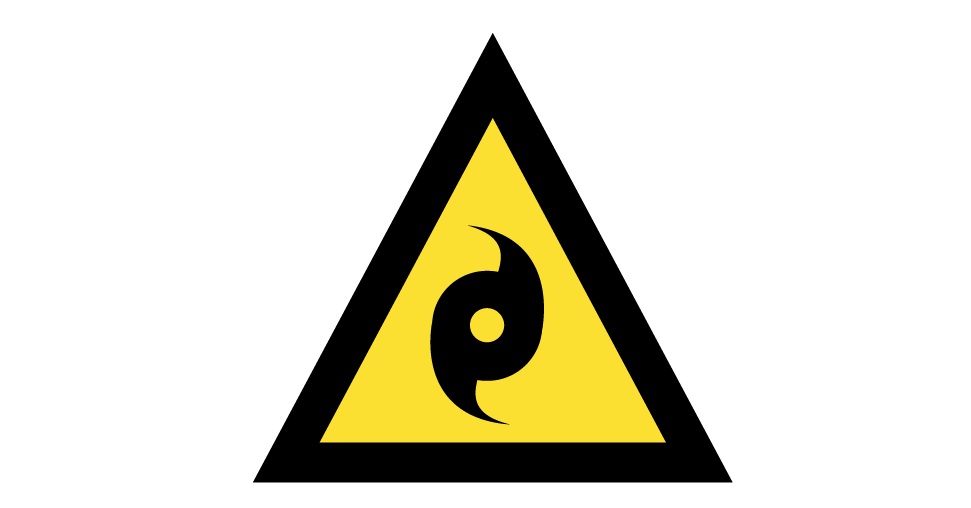
- Prepare now
- Stay informed
- Monitor conditions
- Stay informed/threat is reduced
- Avoid the area
- Return with caution
Call to Action - Watch and Act
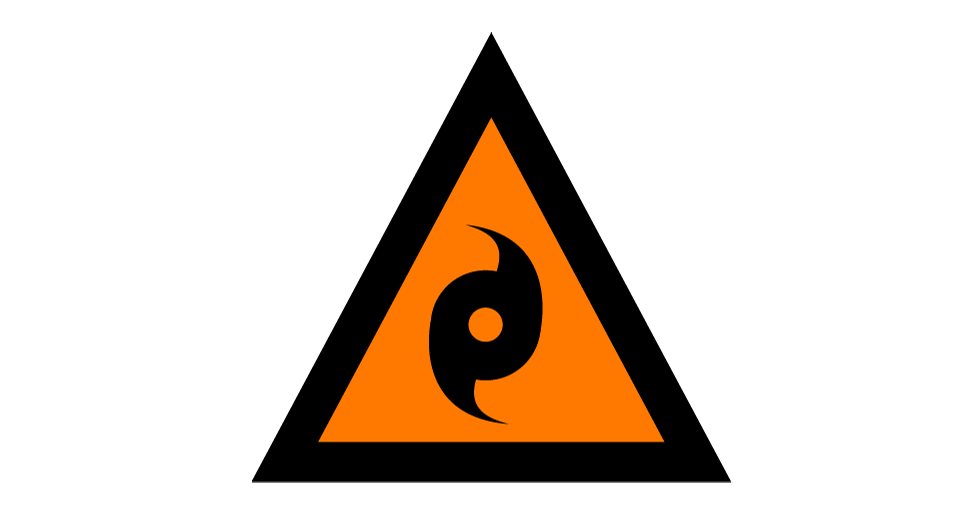
- Prepare to leave/evacuate
- Leave/evacuate now (if you are not prepared)
- Prepare to take shelter
- Move/stay indoors
- Stay near shelter
- Walk two or more streets back
- Monitor conditions as they are changing
- Be aware of ember attack
- Move to higher ground (away from creeks/rivers/coast)
- Limit time outside (cyclone, heat, asthma)
- Avoid the area/avoid the flooded area
- Stay away from damaged buildings and other hazards
- Prepare for isolation
- Protect yourself against the impacts of extreme heat
- Do not enter flood water
- Not safe to return
- Prepare your property (cyclone/storm)
Call to Action - Emergency Warning
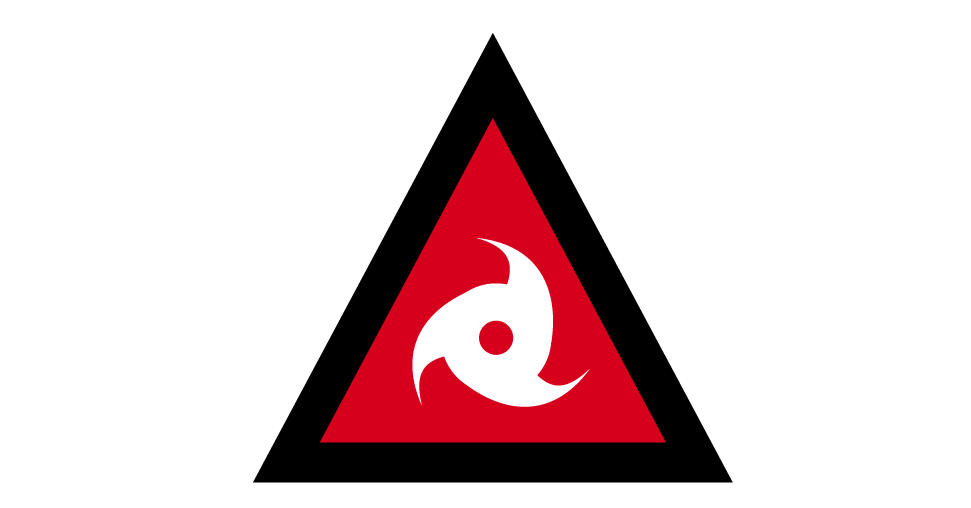
- Leave/evacuate (immediately, by am/pm/hazard timing)
- Seek/take shelter now
- Shelter indoors now
- Too late/dangerous to leave
Your Responsibility
"It is your responsibility to be prepared and be informed!"
If your neighbours are unaware of the following information, do your bit and educate them. If a cyclone forms, track it and do your preparations early. If they are not needed, it doesn't matter, but if they are needed you have protected yourself, your family and your friends - you have done the right thing to help your community to ride out a cyclone impact.
Be Informed
Stay Informed!
"Stay Alert!"
Radio
Community Alerts are available on the local radio, ABC North West and television stations. It is a good idea to have a battery-operated AM/FM radio with extra batteries on hand to keep up to date with the regular updates broadcasted.
Available Radio Stations for Carnarvon and Coral Bay
Download the ABC Listen App on Apple or Android devices, and select ABC Pilbara - Note this will only be accessible if mobile data signal is available.
Television
Keep your eye on the weather forecasts on all free to air channels.
Websites and APPS
Be Educated
Even if you have lived through a cyclone in the past, it is important that you are educated and that you educate your family. This is your responsibility, no one else.
DFES has a lot of great resources you can use.
WHAT'S YOUR GAME PLAN is a great resource to prepare your family for before during and after the cyclone.
DISASTER RESILIENCE is a fabulous resource for families, schools and young people
Australian Warning System DFES is a wonderful page to get to know the new National Australian Warning System
Australian Warning System - National is the official national website for all information and education on the AWS

Be Prepared
It is your responsibility to ensure everyone, including pets remain inside your home or evacuation centre for the duration of the Emergency Warning Alert.
For any further information please contact your local State Emergency Service Unit.
Do you know what you should do?
What's your game plan?
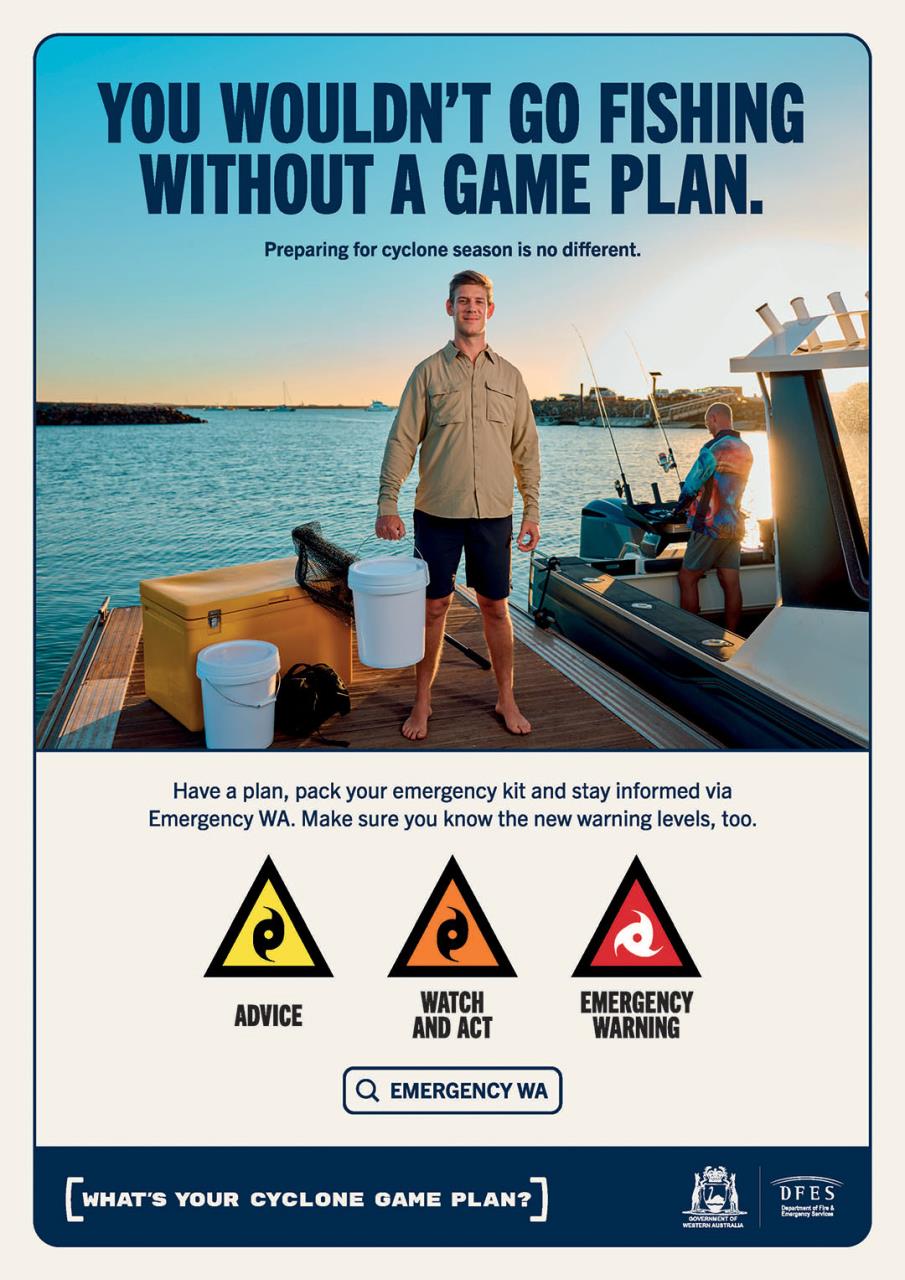 |
DO YOU HAVE A CYCLONE PLAN FOR YOUR FAMILY OR HOUSEHOLD?
Everyone in your household need to agree on a plan before cyclone season, you'll be much better prepared to face whatever nature throws your way.
Deciding what to do during a cyclone is only half the battle. Once the cyclone has passed, you'll also need to have a plan for what to do next.
Department of Fire and Emergency WA has a great resource on their website.
What's Your cyclone Game Plan!
WHAT DO YOU NEED TO CONSIDER?
- Emergency kit - what do you need?
- First Aid kit - Do you have one, is it fully stocked and within the use by date?
- Water - what will you drink when the water gets turned off and how will you flush the toilet?
- How much is enough water and food.
- What will you do with your pets?
- Do your children know what they need to do, like stay inside the house
- Do you know where the evacuation centre is?
- Will your house be safe in a cyclone?
- Do yo need to tie down cars, caravans, trailers etc.
and there is more to consider. And this is ony for before the cyclone comes.
What do you need to consider during the cyclone and after it has passed?
|
Get Ready Early
EARLY CYCLONE SEASON PREPARATION IS A KEY SAFETY MEASURE
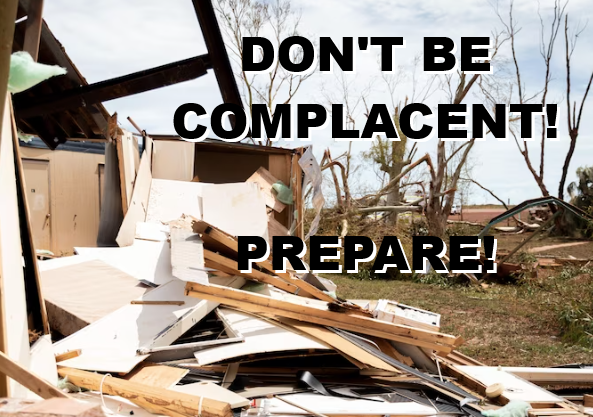
One of the most important things that any individual can do is to prepare their property for the cyclone season. Preparing properly means that damage from a cyclone impact is minimised. This may contribute to the saving of both life and property.
DFES recommends that the following be undertaken before the season commences.
- Clean your residence or work area of unwanted materials and rubbish.
- Trim trees of excess height and growth to enable them to withstand higher winds. Council's annual free clean-up takes away green waste.
- Clear eaves and drains of rubbish or obstructions.
- Have available emergency supplies - first aid kit, torch (and batteries), canned food, portable radio (and batteries), drinking water containers.
- Decide where best to shelter your pets. Inside your home for domestic pets. If you go to the evacuation centre ask a friend to shelter your pet or call the Shire and ask the Rangers for pet shelter.
- Organise tie-down areas and supplies for caravans, boats, trailers, etc.
- Stow or tie-down outdoor furniture, play equipment, trampolines, bikes and other items that could blow away.
The Shire of Carnarvon has a roadside bulk pick up each year around May/June and October/November. Click here for more information on roadside collections
Emergency Kit
Emergency kits are vital for your family to get through a emergency event. Check out this video that the Queensland Government kindly provided.
Would you like a check list?
DFES has kindly provided a check list for you. Click here to download the list
DFES Cyclone Emergency Kit Fact Sheet. Click here to download
Do you know hhere the Evacuation Centre is?
In Carnarvon the evacuation centre is the Woolshed, at the Carnarvon Civic Centre on the corner of Robinson Street and Camel Lane.
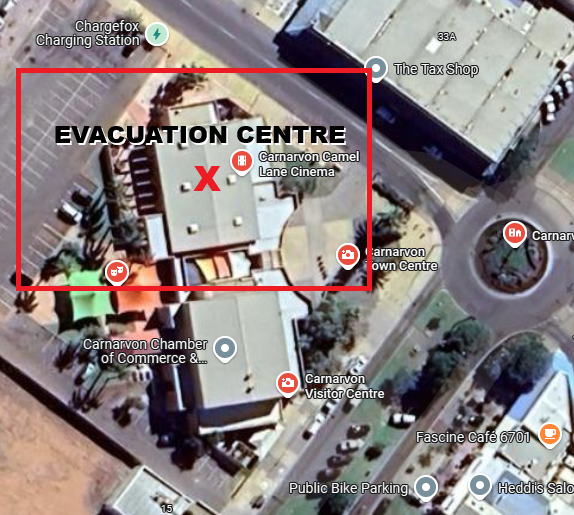
The Evacuation Centre is operated by the Department of Communities.
They do not permit animals in the evacuation centre so ensure you seek adequate shelter for your fur babies and feathered friends. The Shire Ranger can house some dogs at the pound. They will be very safe. Contact the Shire on 9941 0000 for find out more.
Ensure you have your personal items and important documents such as drivers licence, passports, birth certificates etc with you, and some personal hygiene items and clothes for up to 3 days.
Travelling? What you need to know!
TRANSLATE
A cyclone is just as fierce and dangerous as hurricanes and tornados in the northern hemisphere and need to be taken seriously.
The Shire of Carnarvon and the Department of Emergency Services takes every precaution to ensure your safety and the safety of our community. Please be alert, watch for advice and abide by the directions given.
"It is not safe to stay in a caravan or camper during a cyclone"
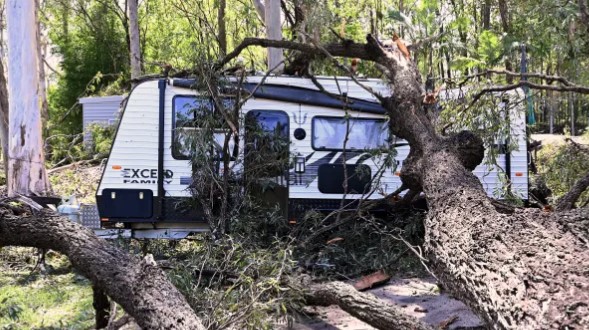
People travelling through Carnarvon, particularly with caravans and campers at the time of an imminent Cyclone may be asked:
- to keep moving south away from the on coming Cyclone if it is safe to do so
- directed to where the caravan or camper can be parked and tied down
- people will be evacuated from tourist and holiday parks
- asked to move to the Evacuation Centre (Woolshed, Carnarvon Civic Centre)
- Do Not travel North unless you have official notification from DFES that it is safe to do so
- Ensure you have an emergency kit
- Let you family know where you are and your situation.
- keep your passport and documents with you at all times
- Ensure you contact your family as soon as practical after the all clear.
- Stay in your safe place until the all clear is given
All directions will be provided by the Department of Fire and Emergency Services (DFES) with the assistance of the Shire of Carnarvon.
You can contact the Shire of Carnarvon for information and directions as provided by DFES.
- Keep yourself informed at all times
- Ensure you are in a safe place
- Ensure you have adequate time to move south to Geraldton or Perth away from the Cyclone
- Listen and watch for evacuation directions in the media, DFES and Shire Facebook pages and the Shire website.
Be Aware
- Supermarkets will enforce item limits if stocks are low during emergency events such as a cyclone or flood
- Supplies to town can take from 3 to 7 days to come through after a cyclone has passed (this will depend on highway damages and access)
Spontaneous Volunteering
WHAT IS A SPONTANEOUS VOLUNTEER
Spontaneous volunteers are individuals or groups of people who have a strong desire to help. They are not affiliated with a volunteer involving organisation or formal emergency responders. Various terms including community volunteers, emergent volunteers and informal volunteers are often used interchangeably with the term spontaneous volunteer. These individuals perceive the immediacy of the situation and believe that their skills, resources, and experiences can help their community recover faster from the disaster. Based on their location and the type of activity they perform, spontaneous volunteers can be categorised into four types: local leaders, local helpers, external leaders and external helpers (Ahmad, 2024: www.volunteeringwa.org.au/assets/downloads/spontaneous-volunteer-engagement-report-vwa-july-2024.pdf)
PASTORAL / FARMER RESPONSE INCIDENT GUIDELINES
Are you having trouble determining whether you are a Spontaneous Volunteer or Bush Fire Brigade Volunteer?
Please use the decision-making tool listed below to assist in making that decision.
Pastoral/Farmer Response Incident Guidelines
